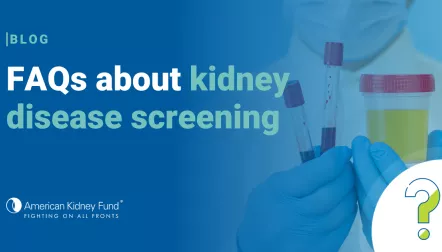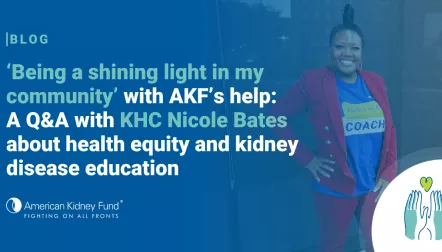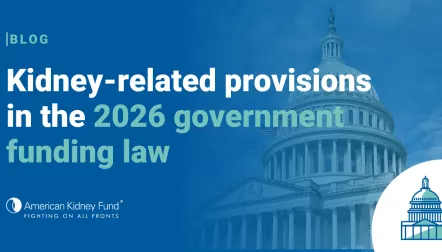
Blog post
Ambassador spotlight: Jess Walters

What made you want to become an AKF Ambassador?
I have been a patient advocate and peer mentor with the Alport Syndrome Foundation since 2015. I have had the privilege of listening to stories from other patients and their families, and I have learned so much from their experiences. In October 2018, I was honored to participate in the International Workshop on Alport syndrome in Siena, Italy. While there, I learned about new possibilities for structural health systems that would significantly improve my quality of life, as well as that of many Americans with chronic illnesses.
The experience of working shoulder-to-shoulder with a global initiative of expert clinicians and researchers on innovative treatment methods for kidney disease motivated me to find ways to make sure that work is heard by elected officials and hospital board members here in the U.S. Becoming an American Kidney Fund (AKF) Ambassador seemed like a worthy cause to serve while achieving that goal.
How has being an AKF Ambassador helped you?
Being an AKF Ambassador makes me feel so connected to the kidney community and my country. Serving in this way is incredibly rewarding because we have the honor to witness real changes in real time and engage with the people making it all happen. The people I have come to know along this journey have enriched my life and made my experience feel more relatable and less isolating.
What have you learned from being an Ambassador?
Working closely with AKF's government relations team has been a very eye-opening experience, as you get to learn a lot about American politics and government processes. My experience as an Ambassador has taught me so much about our legislative system and how much effort and collaboration it often takes for bills to become laws. My education growing up did little to instill the importance of civic duty and constituent participation in public policy, but becoming an Ambassador has afforded me the experience of a hands-on learning environment with endless resources and a vast support network. I have come to better understand my roles and become active in shaping the policies that deeply affect me and the other people I love in this community.
Why should others become Ambassadors?
Being chronically ill can be extremely disempowering. Being an AKF Ambassador is a surefire way to know that your voice is being heard and your story is being told.
The biggest hurdle of kidney disease for me has been my identity with the labels associated with being "disabled," and it was easy for me to lose myself to my diagnosis in a lot of ways. Becoming an Ambassador and getting to engage with others helped me see my experience from a different perspective. I have been able to channel my feelings of being a burden into incredibly constructive and rewarding work that creates a better quality of life for myself and others. Kidney disease should never have to be endured alone, and becoming an Ambassador is a great way to find a supportive and compassionate community of like-minded people who want to see positive change in the world.
How would you like to stay connected to other Ambassadors?
Email and texting. Maybe a video chat or hangout from time to time for social activities.
What is something you've learned about kidney disease and dialysis that you wish you knew a lot sooner?
Hospitals almost always have warm blankets stashed somewhere, and friendly words to nurses and staff go a long way. I know it sounds like a small thing, but being nice to nurses is extremely vital for a better quality of life.
On a more serious note, being a dialysis patient and then receiving a kidney transplant in 2018 shined a glaring light on the injustices of our health care system. I wish I had known about the direct connections between socioeconomic status, high-salt foods, high blood pressure and kidney failure, so I might have been able to better protect my kidney function from getting worse.
What do you wish elected officials knew about dialysis patients?
I wish elected officials knew that the dialysis patients they meet and engage with are a snapshot of a living population facing the threat of exponential growth. From everything I have learned as a patient and Ambassador, I have come to understand that the growing population of dialysis patients is a failure of the system more than it is a plague of an unprecedented disease. Kidney failure and dialysis are largely preventable, and understanding the circumstances that lead to kidney failure offers a glimpse into the upstream challenges that continue to create more and more dialysis patients each year.
Do you have any advice for newly diagnosed kidney patients?
Take deep breaths. Kidney disease is a marathon, not a sprint. Trying to do everything, learn everything and process everything all at once will leave you exhausted and overwhelmed. Take small bites of information and go slow.
Find a kidney buddy — a peer support mentor who has already been through dialysis and/or a transplant. That person can guide you through inevitable faux paus and give you the best tips for surviving a kidney-friendly food and fluid plan. Know that no matter how isolating and lonely the experience can feel, the kidney disease community is one of the largest and most supportive communities one could possibly be a part of.
How does it help having a family member be part of the process?
Having a family member or friend be part of the process is essential. My heart hurts for people who feel like they have to endure kidney disease alone, which is the main reason I dedicate so much of my time to being an Ambassador and peer support provider. All of my successes throughout diagnosis, treatment, dialysis and transplant were because I had my husband, Ian, by my side every step of the way. He has supported me, cared for me and did all of the heavy lifting when I wasn't able.
Living with a chronic illness and disability, I became my own worst enemy in the moments when I would get stuck in my head thinking about what was happening to me. Having someone actively participating in the experience with me, even if sometimes it was just to bounce my irrational thoughts off of him, made all the difference. I attribute all of my success to the support of my family.
What are some interesting facts about yourself that you'd like to share?
I call myself a "Renaissance womxn" due to my insatiable curiosity that has resulted in a lifetime of discovering and honing random skills. I drive a stick and change my own oil, am a skilled cook and can bake things from scratch, and am fluent in American Sign Language.
I used to live in Washington, D.C. — my forever home away from home — where my Deaf-Queer identity was born. I am a published poet, mixed-media artist and life model who looks for opportunities to make the mundane more realistically surreal.





